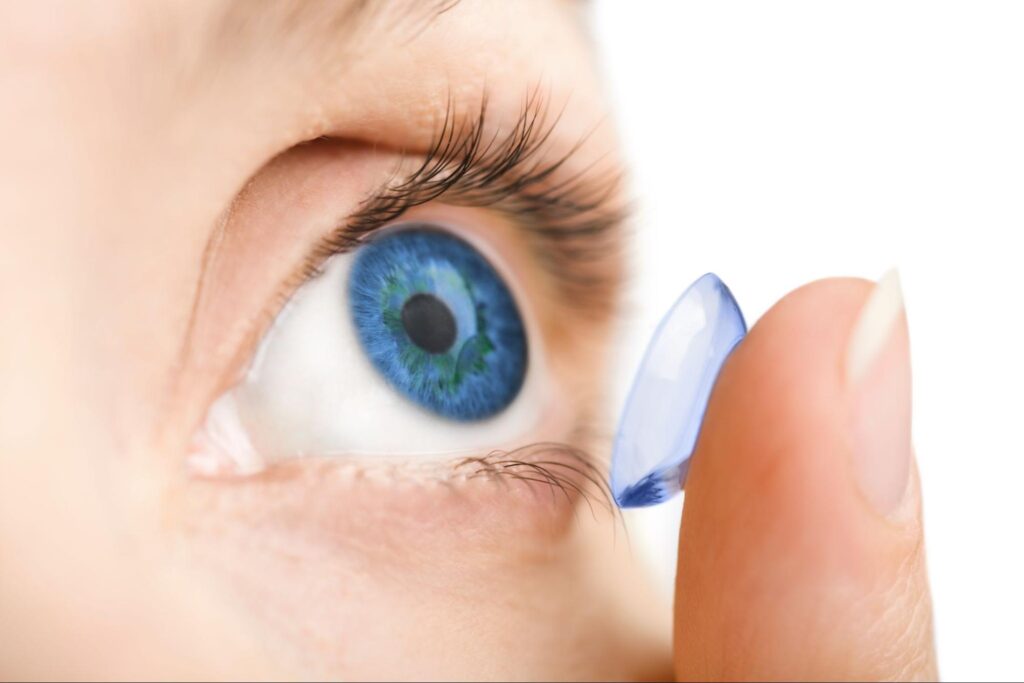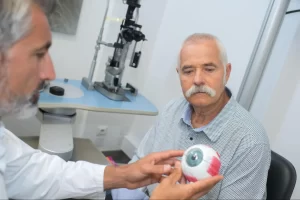Is An Online Eye Test Enough? Let’s Talk About It!
Have you ever tried squinting at your phone, wondering if it’s just poor lighting or if your eyesight is deceiving you? You’re not alone. Vision changes can sneak up on us—one day, you’re reading street signs effortlessly, and the next, you’re holding the menu at arm’s length, hoping the words will magically come into focus. Then there’s the big question: should you schedule an eye test with an optometrist or just take a quick eye test online? A quick, online eye test might be tempting, right? A few clicks, no waiting in line, and suddenly—you have a prescription. But is that enough? Keep reading because the answer might surprise you.
Eye Tests: More Than Just Reading Letters
A proper eye test isn’t just about seeing clearly, it’s also about maintaining your eye health. When you visit an eye doctor, they assess more than just how well you can read an eye chart. They examine the full picture: your eye health, your optic nerve, and even signs of other health conditions, such as diabetes or high blood pressure. You sit in the chair, cover one eye, and read some letters, of course. However, they also measure the pressure inside your eyes, test how your pupils respond to light, and look for early signs of eye diseases like glaucoma. While it may be tempting to take an eye test online, these digital screenings can’t replace a comprehensive in-person exam that ensures your eyes are truly healthy. It’s a thorough check-up for your vision and overall health.

The sad reality is that your vision doesn’t always give a warning when something goes wrong. Some eye diseases develop silently, without noticeable symptoms. Regular eye exams can help detect these problems early so you aren’t faced with sudden vision loss or permanent damage later. While an online eye test might seem like a quick solution, it can’t replace a comprehensive in-person exam that evaluates your overall eye health. And let’s be honest—when was the last time you had your eyes examined? If you can’t remember, it’s probably time to book that appointment
Wearing the wrong glasses or contacts can cause headaches and eye strain. Let 414 Eyes help you find the perfect fit for your vision.
Can Online Eye Tests Replacement In-Person Visits?
Online eye tests sound super convenient. You sit in front of a screen, follow some prompts, and get results in minutes. If all you need is a quick prescription check, it can be useful. But here’s the catch: an online eye test only checks how well you see at various distances. That’s it. It doesn’t check for eye diseases, measure eye pressure, or examine your retina. And if you’ve been struggling with eye strain, headaches, or blurry vision, an online test won’t tell you why that’s happening.
The Risks of Skipping a Comprehensive Eye Exam
Imagine relying on an eye test online, thinking everything’s fine—only to find out later that you have an eye condition that could’ve been caught early. That’s the risk. These quick tests might tell you if you need new glasses, but they won’t spot the hidden issues that an eye specialist could catch—issues that could impact your vision for life.

Online Eye Tests: Good for Some, Risky for Others
Online eye tests can work for some people—like those who’ve had an eye exam recently and just need a prescription update. But if it’s been a while since you’ve seen an eye care professional, relying on an online test alone could mean missing something important. Always follow the directions of an eye care professional to ensure your vision stays healthy.
Signs You Should See an Eye Doctor Instead
- Frequent headaches or eye pain
- Trouble seeing at night
- Blurry vision, even with glasses
- A family history of eye disease
- Sensitivity to light or seeing flashes
If any of these sound familiar, it’s best to book a real eye exam.
Contact Lenses, Glasses, And Vision Health

Clear Vision Care You Can Trust
Online eye tests may seem convenient, but they can’t replace a comprehensive in-office exam. At 414 Eyes, we go beyond just checking your vision—we provide eye exams, prescription eyeglasses, and contact lenses to ensure you get the most accurate prescription for clear, comfortable sight.
Our expert team also offers macular degeneration testing, glaucoma management, dry eye treatment, and myopia control, detecting and addressing eye conditions before they impact your vision. Don’t settle for a quick fix—trust 414 Eyes for thorough, professional care that keeps your eyes healthy for the long run.
Struggling with Eye Strain? We Can Help! Too much screen time? Blurry vision? Let our experts provide personalized solutions for improved eye health.
FAQs
What does a circular shape on an eye test mean?
A circular shape may be used in vision charts to check contrast sensitivity and how well the eyes distinguish between shades. However, an eye online test may not accurately assess this aspect of vision compared to a comprehensive eye exam.
Can vision issues develop at any age?
Yes, vision issues can develop at any age. While children may experience difficulty in school due to undiagnosed eye problems, adults may notice changes in visual acuity over time. Regular eye exams help identify these issues early.
How do optometrists diagnose conditions like glaucoma or macular degeneration?
Optometrists use a variety of eye examination techniques and other tests to diagnose conditions like glaucoma or macular degeneration. They measure eye pressure, examine the optic nerve, and assess retinal health. In some cases, advanced imaging and visual field tests are used to detect early signs before symptoms appear. While an online eye test can provide basic vision screening, it cannot replace a comprehensive eye examination by a professional.
What’s the difference between an optometrist and an ophthalmologist?
An optometrist performs eye examinations, prescribes corrective lenses, and detects common eye conditions. An ophthalmologist, on the other hand, is a medical doctor who can diagnose and treat complex eye diseases, perform surgery, and manage advanced vision problems. Both play an important part in eye care, but their roles differ.
Can a complete blood count (CBC) or liver function tests detect eye-related health issues?
Yes, a CBC or liver function test can sometimes reveal underlying conditions that affect vision. Certain diseases, such as diabetes or liver disorders, can lead to eye complications, making these tests an important part of overall health monitoring. However, a thorough eye test and eye examination remain crucial for detecting eye diseases directly.
What are the early symptoms of eye conditions that people often ignore?
Many people overlook symptoms such as difficulty focusing on their right eye, sudden blurry vision, frequent headaches, eye strain, or increased sensitivity to light. Ignoring these warning signs could lead to worsening conditions like short-sightedness, dry eye syndrome, or more serious vision problems.
How does opioid withdrawal affect vision, and can it cause eye-related symptoms?
Yes, opioid withdrawal can impact vision. Symptoms may include light sensitivity, blurry vision, and difficulty focusing. In some cases, withdrawal may also affect pupillary distance and cause discomfort when using eyeglasses or corrective lenses. If these symptoms persist, an eye examination is recommended to rule out any underlying issues.
Can an online eye test measure pupillary distance accurately?
While some online eye test options claim to measure pupillary distance, they may not be as precise as an in-office measurement by an eye specialist. Using an inaccurate device or measurement can result in eyeglasses that don’t fit properly, leading to discomfort and vision strain.
Is short-sightedness the same as blurry vision?
No, short-sightedness (myopia) is a specific refractive error that makes distant objects appear blurry, while blurry vision can result from various factors, including dry eyes, incorrect corrective lenses, or an undiagnosed eye condition. A proper eye examination can determine the cause.
Should I worry if I see flashes of light in my vision?
Yes, flashes of light, especially if accompanied by floaters, could indicate a retinal issue that requires immediate medical attention. If you repeat seeing flashes, consult an eye specialist as soon as possible.
Is there a difference between reading glasses and prescription eyeglasses?
Yes, over-the-counter reading glasses are designed for general near-vision correction, while eyeglasses prescribed by an optometrist are customized to your pupillary distance, astigmatism, and overall visual needs. An eye test and eye examination ensure you get the right fit.



